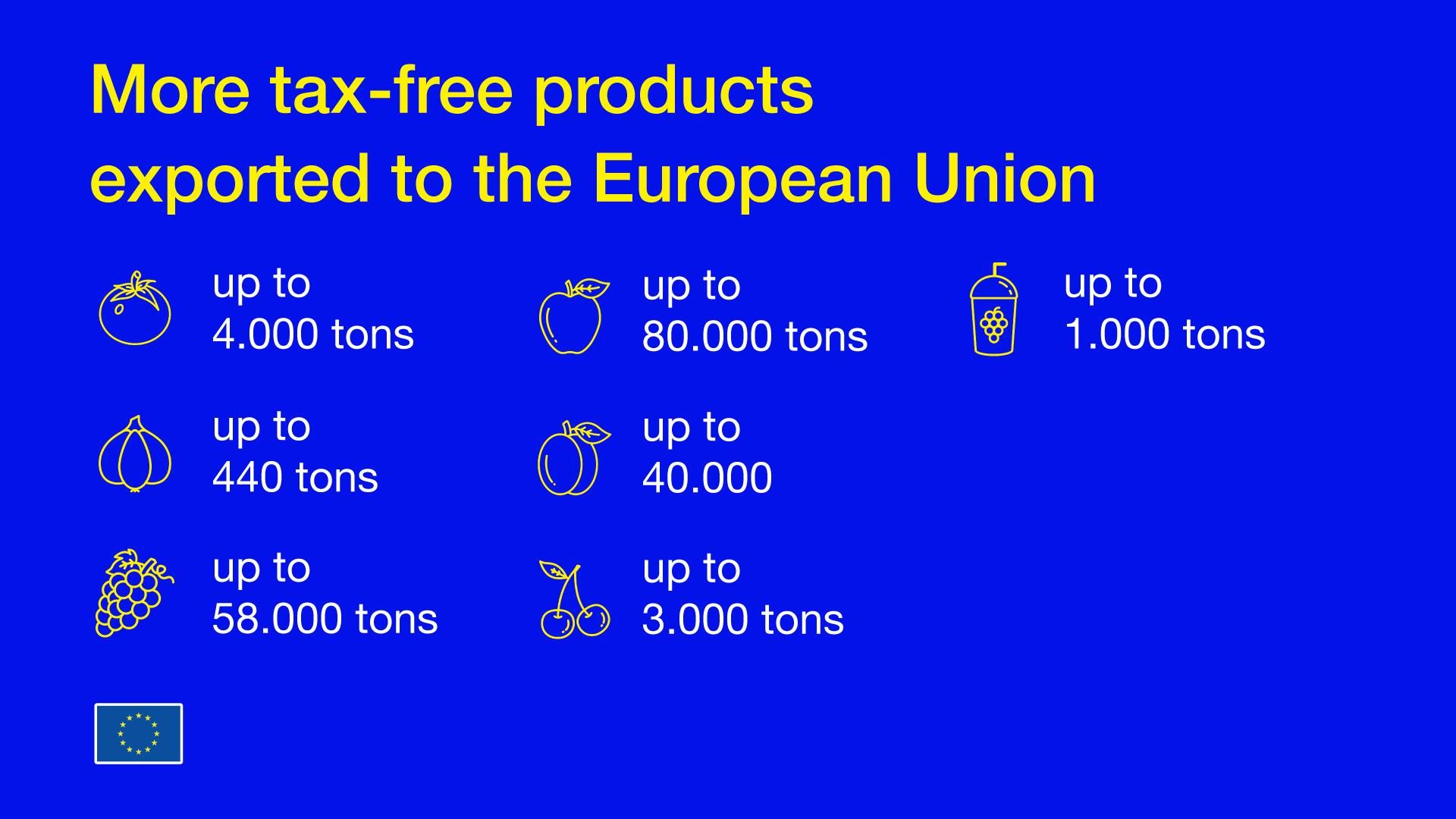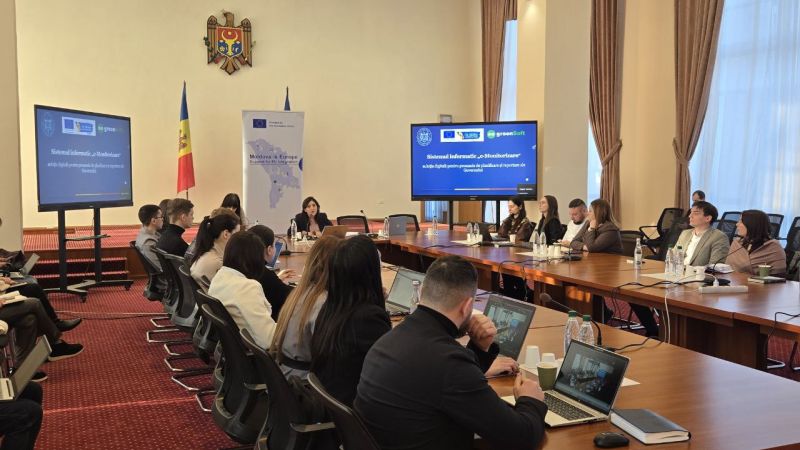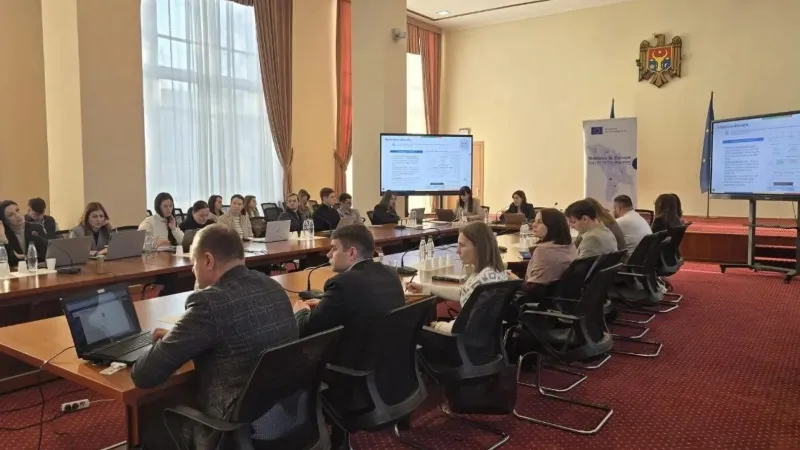
UE facilitează creșterea exporturilor de produse agricole din Republica Moldova
În curând, pe piețele europene urmează să ajungă fără taxe vamale mai multe prune, struguri și alte produse agricole moldovenești. Comisia Europeană a propus astăzi un regulament care să permită îmbunătățirea temporară a accesului pe piață pentru restul de șapte produse din Republica Moldova care sunt încă supuse cotelor tarifare la intrarea în UE. Aceasta este o ilustrare a solidarității UE, menită să ajute Republica Moldova să facă față pierderii principalelor sale piețe și centre de tranzit pentru aceste produse agricole cheie, ca urmare a războiului de agresiune nejustificat al Rusiei împotriva Ucrainei.
Președintele Comisiei Europene, Ursula von der Leyen, a declarat: „Agresiunea neprovocată și nejustificată a Rusiei afectează grav nu doar economia Ucrainei, ci și pe cea a vecinilor săi și ai noștri, în cazul de față, a Moldovei. Decizia de astăzi, prin care șapte cote pentru exporturile agricole moldovenești cheie au fost mai mult decât dublate, reprezintă un răspuns concret al solidarității UE.”
Vicepreședintele executiv al Comisiei Europene și comisarul pentru comerț, Valdis Dombrovskis, a declarat: „Capacitatea Moldovei de a face comerț extern a fost afectată de războiul brutal și ilegal al Rusiei. Prin facilitarea accesului la piață pentru produsele agricole cheie, UE ajută Republica Moldova să-și redirecționeze comerțul afectat. Acest lucru îi va ajuta direct pe producătorii moldoveni, sprijinind reziliența economică a țării în actualele circumstanțe dificile. UE acționează din nou pentru a sprijini o țară vecină europeană.”
Comisarul european pentru agricultură, Janusz Wojciechowski, a declarat: „Sper că această măsură fără precedent va sprijini producătorii moldoveni în atenuarea pe termen scurt a unora dintre presiunile pieței. Pe termen lung, îi încurajăm pe omologii noștri moldoveni să investească în capacități de procesare și producție cu valoare adăugată mai mare. Creșterea în continuare a calității produselor acestora va contribui la consolidarea poziției producătorilor moldoveni pe piața UE. Suntem pregătiți să oferim asistență tehnică în acest sens.”
Practic, toate produsele moldovenești pot intra deja în UE fără taxe vamale, în cadrul Zonei de Liber Schimb Aprofundat și Cuprinzător UE-Moldova (DCFTA).
Măsurile propuse vizează celelalte șapte produse, pentru care exporturile din Moldova în UE nu sunt încă pe deplin liberalizate: prune, struguri de masă, mere, roșii, usturoi, cireșe și suc de struguri. Regulamentul prevede mai mult decât dublarea cantității acestor produse pe durata unui an, care pot fi importate fără taxe vamale din Moldova în UE. Volumele potențiale de importuri scutite de taxele vamale vor fi acum în valoare de aproximativ 55 de milioane de euro, dintre care aproximativ 10 milioane de euro pentru prune și 27 de milioane de euro pentru struguri de masă.
Liberalizarea suplimentară a importurilor în UE va ajuta producătorii și exportatorii din Moldova să depășească pierderile de piață, pe care le-au suferit ca urmare a războiului Rusiei împotriva Ucrainei. Împreună cu accesul sporit la transportul rutier în UE (în prezent în curs de negociere între Republica Moldova și UE), liberalizarea ar trebui să faciliteze considerabil exportul de produse moldovenești către și prin UE. De asemenea, suntem deschiși să discutăm despre o liberalizare reciprocă suplimentară, care ar face ca UE și Moldova să facă încă un pas în direcția liberalizării depline a comerțului.
Pași următori
Propunerea urmează acum să fie analizată și aprobată de Parlamentul European și de Consiliul Uniunii Europene.
Context
Republica Moldova a beneficiat de un Acord de Asociere, inclusiv DCFTA, cu UE din 2014. Acest sistem comercial preferențial a permis Republicii Moldova să profite de eliminarea taxelor vamale la exportul către UE în raport cu toate mărfurile, cu excepția a șapte produse agricole. Moldova se bucură, de asemenea, de acces sporit la piața serviciilor din UE și de condiții mai bune de investiții. La rândul său, Moldova s-a angajat să-și armonizeze legislația cu acquis-ul UE într-o gamă largă de domenii.
Măsurile temporare și excepționale propuse astăzi de Comisia Europeană vor sprijini și stimula în continuare fluxurile comerciale existente din Moldova către UE și vor susține economia Moldovei. Acest lucru este în conformitate cu principalele obiective ale Acordului de Asociere, care sunt de a stabili condiții pentru consolidarea relațiilor economice și comerciale, care ar conduce la integrarea treptată a Moldovei pe Piața Internă a UE, precum și de a contribui la consolidarea democrației și a stabilității politice, economice și instituționale în Moldova.
De asemenea, UE sprijină Republica Moldova cu asistență financiară semnificativă pentru a ajuta țara să facă față situației create de agresiunea rusă în Ucraina.







